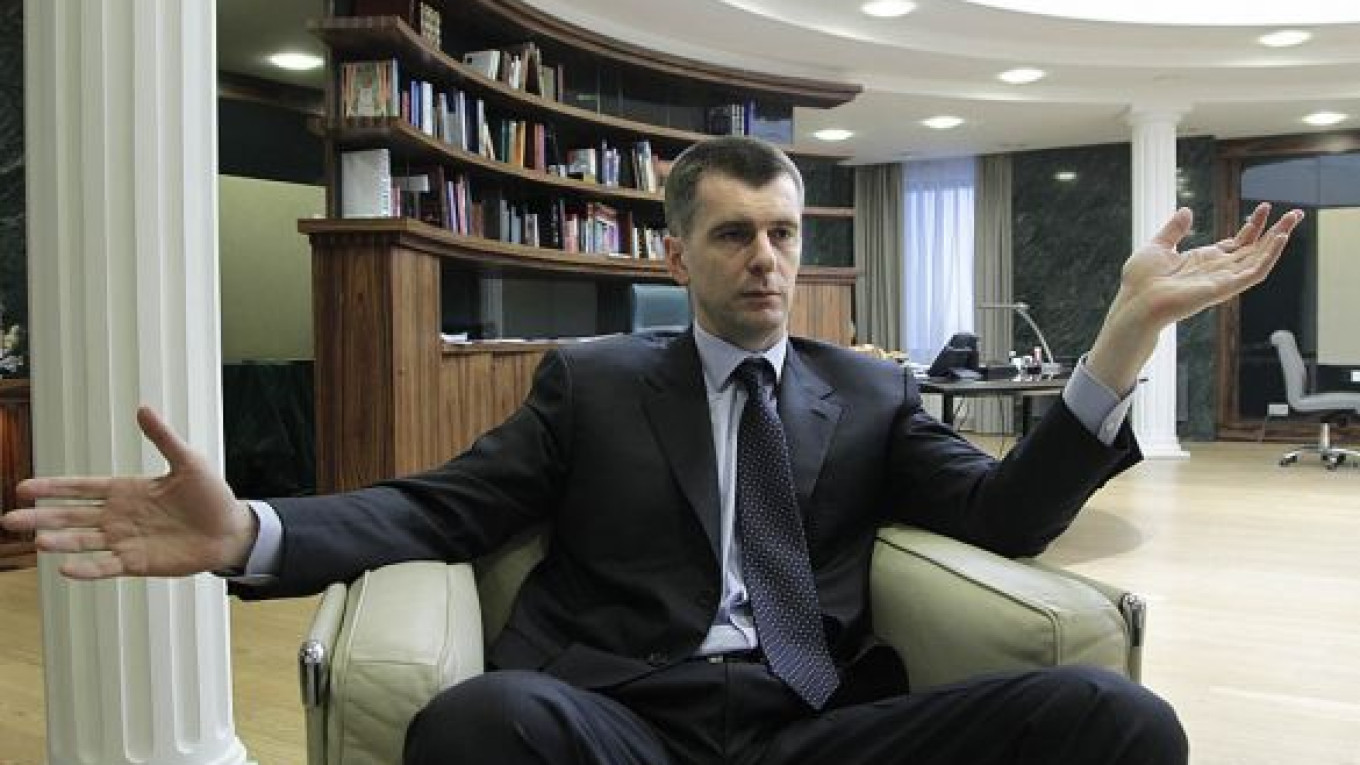Billionaire Mikhail Prokhorov has created his own political party, but the former presidential candidate's efforts to distance himself from the protest movement mean he will remain loyal to the Kremlin, analysts said.
Prokhorov, 47, who kept a low profile after reaping more than 6 million votes in the presidential election in March, unveiled his new Civil Platform Party at a news conference Monday.
The party will participate mostly in regional elections in cities bigger than 500,000 people, Prokhorov said.
He was flanked by sister Irina Prokhorova, RBC television general director Alexander Lyubimov and Federation Council Senator Alexander Pochinok, a former tax and labor minister.
"The only aim of this party is to hold a license, to allow leaders of civil society to take part in elections, since this political system is not the one where we want to work," he said.
A flamboyant politician and owner of the New Jersey Nets basketball team, Prokhorov came in third in the presidential election. He was seen as a decent alternative to other, more seasoned politicians.
Civil Platform will include members of Prokhorov's presidential campaign team as well as former members of the liberal Right Cause party, which he briefly chaired in 2011. The new party will be limited to 500 members, Prokhorov said.
Five hundred is the minimum needed to create a political party under liberalizing legislation passed in response to mass public protests in December.
Prokhorov will be chairman of the party but not an official member, he said Monday.
President Vladimir Putin likewise, while chairman of United Russia, did not become a party member. That move later helped him distance himself from the increasingly unpopular party.
Despite dabbling in opposition politics, Prokhorov has avoided criticizing Putin. He did attend an anti-Kremlin protest but did not speak publicly at the event.
Prokhorov said Monday that his party would be an "evolutionary path" for national politics.
"We are against revolutions," he said, adding that he would not attend an opposition march June 12, Russia Day. The opposition lacks a definitive strategy "to influence the authorities," he said.
Prokhorov has funded opposition figures, among them longtime friend Boris Nemtsov, a source within the movement told The Moscow Times. Prokhorov also supported an opposition candidate in Krasnoyarsk, where his $13 billion business is registered.
Analysts described Prokhorov as a "manageable politician" who would use the party to keep his head in politics.
"Prokhorov has political capital and doesn't want to lose it, so he's going to imitate some political activity," said Pavel Salin, an analyst at the Center for Current Politics, a think tank.
Prokhorov has sent mixed signals about his future as a politician. An opposition-minded State Duma deputy who met him recently said Prokhorov wanted to shed politics in favor of his business and personal life.
Prokhorov will avoid conflicts with the Kremlin, which recently put some of his allies in top governmental positions, Salin said.
One such ally is Olga Golodets, who previously worked with Prokhorov at Norilsk Nickel. She was appointed deputy prime minister for social issues.
Sergei Yeroshenko, a businessman close to Prokhorov, recently became governor of the Irkutsk region, which hosts Polyus Gold, a mining firm run by Prokhorov.
Some critics said Civil Platform's inclusion of controversial spin doctor Rifat Shaikhutdinov on its advisory board substantially diminishes its merit.
Shaikhutdinov, a former Duma deputy, was blamed for ruining Right Cause's parliamentary campaign in December.
Becoming the leader of Right Cause was Prokhorov's first attempt to run a political party. Despite Prokhorov's attempts to make it the largest party after United Russia, Right Cause failed to enter the Duma.
A Message from The Moscow Times:
Dear readers,
We are facing unprecedented challenges. Russia's Prosecutor General's Office has designated The Moscow Times as an "undesirable" organization, criminalizing our work and putting our staff at risk of prosecution. This follows our earlier unjust labeling as a "foreign agent."
These actions are direct attempts to silence independent journalism in Russia. The authorities claim our work "discredits the decisions of the Russian leadership." We see things differently: we strive to provide accurate, unbiased reporting on Russia.
We, the journalists of The Moscow Times, refuse to be silenced. But to continue our work, we need your help.
Your support, no matter how small, makes a world of difference. If you can, please support us monthly starting from just $2. It's quick to set up, and every contribution makes a significant impact.
By supporting The Moscow Times, you're defending open, independent journalism in the face of repression. Thank you for standing with us.
Remind me later.


